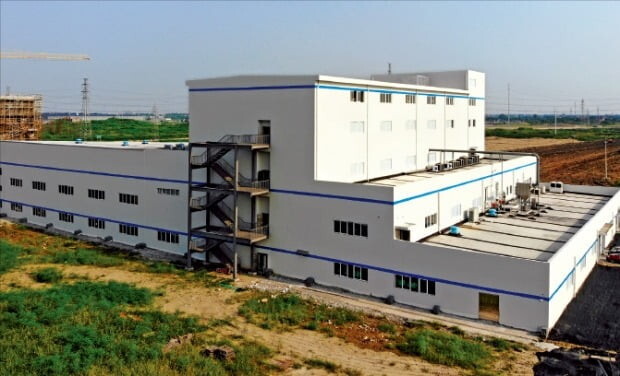hankyoreh
Links to other country sites 다른 나라 사이트 링크
Electric battery industry attracts players from other industries

As tougher environmental regulations have ushered in a new era of electric vehicles, the growth of the battery industry is fueling growth in other industries as companies jump on the battery bandwagon. In particular, businesses whose existent projects have exhausted their growth potential are actively seeking out battery-related industries to pave their future paths.
POSCO provides an illustrative example of such a business. In 2018, POSCO settled on cathode/anode materials -- key components of rechargeable batteries -- as an area for future growth, setting a sales target of 17 trillion won (US$14.01 billion) by 2030. South Korea’s most prominent steel producer is looking to batteries as a source of future opportunities to offset stagnation in the steel sector. In August 2019, POSCO built a factory for a joint venture in cathode materials – capable of an annual production of 5,000 tons -- in Tongxiang, Zhejiang Province, near a production base for Chinese electric vehicle battery manufacturers. This gave it a total domestic and overseas production scale of 20,000 tons, and the company is investing aggressively to increase production to 45,000 tons this year.
To establish a stable source of lithium, POSCO spent US$280 million to acquire lithium salt flats in Argentina; in June 2019, it established a rechargeable battery material research center for its headquarters and affiliates to pursue integrated research into rechargeable battery materials.
Doosan, which has been struggling with plummeting sales in the coal-fired and nuclear power industries, is now moving into the area of battery foil, another material in electric vehicle batteries. The materials company Doosan Solus, which was spun off from Doosan as an independent business in October of last year, secured battery foil source technology with the 2014 acquisition of Circuit Foil in Luxembourg. A thin copper membrane that goes into electric vehicle anode materials, battery foil is directly linked to battery efficiency, as thinner materials can be filled with more lithium ions. Doosan Solus is building a battery foil factory on a 144,000 square meter site in Hungary’s Tatabanya industrial complex -- which is located near Samsung SDI and SK Innovation battery factories -- and plans to begin full-scale mass production by the second half of this year. As the only electric foil factory in Europe, it “established cost competitiveness thanks to the reduced distribution costs, and is highly competitive in terms of quality stability, with the material’s fast oxidation and short lifespan,” Doosan Solus said.
By Kim Eun-hyoung, staff reporter
Please direct comments or questions to [english@hani.co.kr]

Editorial・opinion
![[Column] Season 2 of special prosecutor probe may be coming to Korea soon [Column] Season 2 of special prosecutor probe may be coming to Korea soon](https://flexible.img.hani.co.kr/flexible/normal/500/300/imgdb/original/2024/0426/3317141030699447.jpg) [Column] Season 2 of special prosecutor probe may be coming to Korea soon
[Column] Season 2 of special prosecutor probe may be coming to Korea soon![[Column] Park Geun-hye déjà vu in Yoon Suk-yeol [Column] Park Geun-hye déjà vu in Yoon Suk-yeol](https://flexible.img.hani.co.kr/flexible/normal/500/300/imgdb/original/2024/0424/651713945113788.jpg) [Column] Park Geun-hye déjà vu in Yoon Suk-yeol
[Column] Park Geun-hye déjà vu in Yoon Suk-yeol- [Editorial] New weight of N. Korea’s nuclear threats makes dialogue all the more urgent
- [Guest essay] The real reason Korea’s new right wants to dub Rhee a founding father
- [Column] ‘Choson’: Is it time we start referring to N. Korea in its own terms?
- [Editorial] Japan’s rewriting of history with Korea has gone too far
- [Column] The president’s questionable capacity for dialogue
- [Column] Are chaebol firms just pizza pies for families to divvy up as they please?
- [Column] Has Korea, too, crossed the Rubicon on China?
- [Correspondent’s column] In Japan’s alliance with US, echoes of its past alliances with UK
Most viewed articles
- 1AI is catching up with humans at a ‘shocking’ rate
- 2Korea’s 1.3% growth in Q1 signals ‘textbook’ return to growth, says government
- 3No good, very bad game for Korea puts it out of Olympics for first time since 1988
- 4[Column] Park Geun-hye déjà vu in Yoon Suk-yeol
- 5[Column] Season 2 of special prosecutor probe may be coming to Korea soon
- 6Division commander ordered troops to enter raging flood waters before Marine died, survivor says
- 7Is Japan about to snatch control of Line messenger from Korea’s Naver?
- 8After election rout, Yoon’s left with 3 choices for dealing with the opposition
- 9Will NewJeans end up collateral damage in internal feud at K-pop juggernaut Hybe?
- 10Marriages nosedived 40% over last 10 years in Korea, a factor in low birth rate